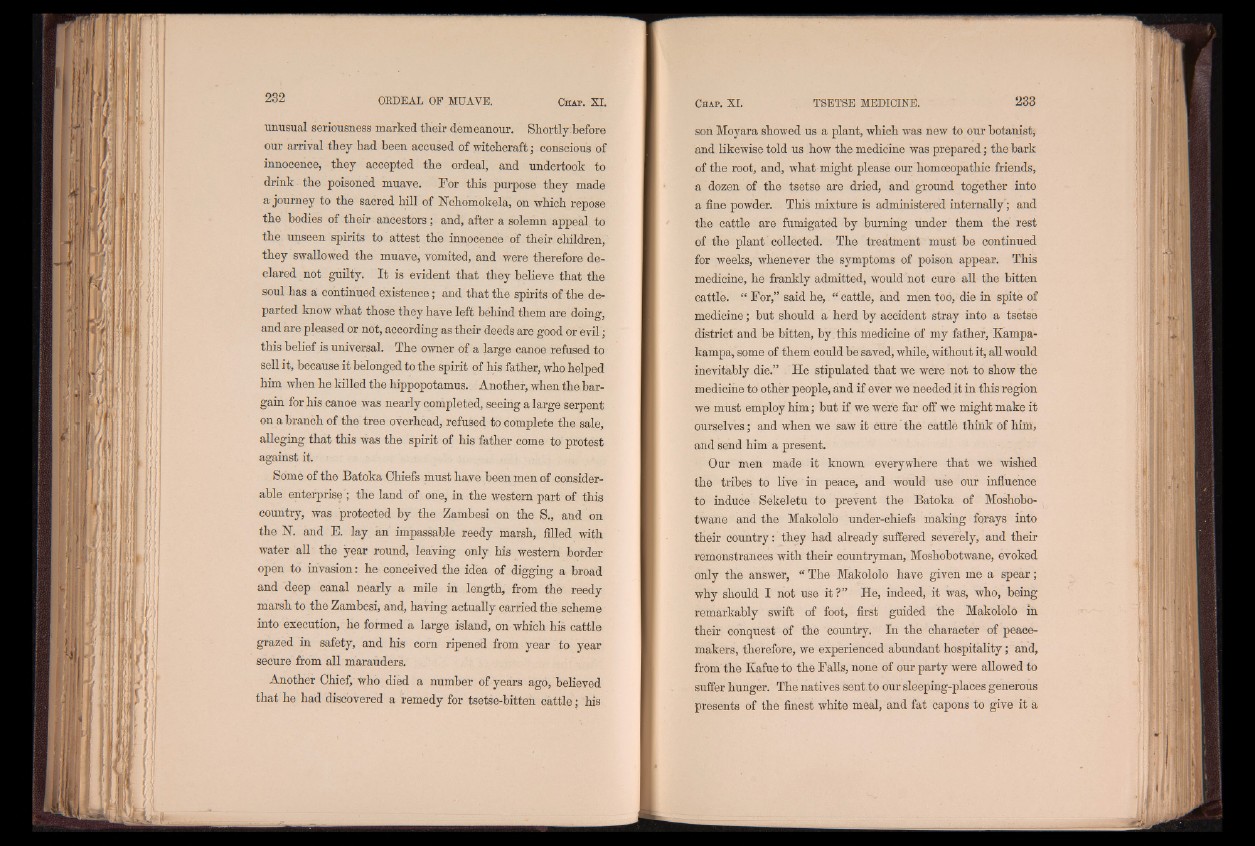
unusual seriousness marked their demeanour. Shortly before
our arrival they had been accused of witchcraft; conscious of
innocence, they accepted the ordeal, and undertook to
drink the poisoned muave. For this purpose they made
a journey to the sacred hill of Nchomokela, on which repose
the bodies of their ancestors ; and, after a solemn appeal to
the unseen spirits to attest the innocence of their children,
they swallowed the muave, vomited, and were therefore declared
not guilty. I t is evident that they believe that the
soul has a continued existence; and that the spirits of the departed
know what those they have left behind them are doing,
and are pleased or not, according as their deeds are good or evil;
this belief is universal. The owner of a large canoe refused to
sell it, because it belonged to the spirit of his father, who helped
him when he killed the hippopotamus. Another, when the bargain
for his canoe was nearly completed, seeing a large serpent
on a branch of the tree overhead, refused to complete the sale,
alleging that this was the spirit of his father come to protest
against it.
Some of the Batoka Chiefs must have been men of considerable
enterprise ; the land of one, in the western part of this
country, was protected by the Zambesi on the S., and on
the N~. and E. lay an impassable reedy marsh, filled with
water all the year round, leaving only his western border
open to invasion: he conceived the idea of digging a broad
and deep canal nearly a mile in length, from the reedy
marsh to the Zambesi, and, having actually carried the scheme
into execution, he formed a large island, on which his cattle
grazed in safety, and his com ripened from year to year
secure from all marauders.
Another Chief, who died a number of years ago, believed
that he had discovered a remedy for tsetse-bitten cattle; his
son Moyara showed us a plant, which was new to our botanist;
and likewise told us how the medicine was prepared; the bark
of the root, and, what might please our homoeopathic friends,
a dozen of the tsetse are dried, and ground together into
a fine powder. This mixture is administered internally; and
the cattle are fumigated by burning under them the rest
of the plant collected. The treatment must be continued
for weeks, whenever the symptoms of poison appear. This
medicine, he frankly admitted, would not cure all the bitten
cattle. “ For,” said he,. “ cattle, and men too, die in spite of
medicine; but should a herd by accident stray into a tsetse
district and be bitten, by this medicine of my father, Kampa-
kampa, some of them could be saved, while, without it, all would
inevitably die.” He stipulated that we were not to show the
medicine to other people, and if ever we needed it in this region
we must employ him; but if we were far off we might make it
ourselves; and when we saw it cure the cattle think of him,
and send him a present.
Our men made it known everywhere that we wished
the tribes to live in peace, and would use our influence
to induce Sekeletu to prevent the Batoka of Moshobo-
twane and the Makololo under-chiefs making forays into
their country: they had already suffered severely, and their
remonstrances with their countryman, Moshobotwane, evoked
only the answer, “ The Makololo have given me a spear;
why should I not use it? ” He, indeed, it was, who, being
remarkably swift of foot, first guided the Makololo in
their conquest of the country. In the character of peacemakers,
therefore, we experienced abundant hospitality; and,
from the Kafue to the Falls, none of our party were allowed to
suffer hunger. The natives sent to our sleeping-places generous
presents of the finest white meal, and fat capons to give it a